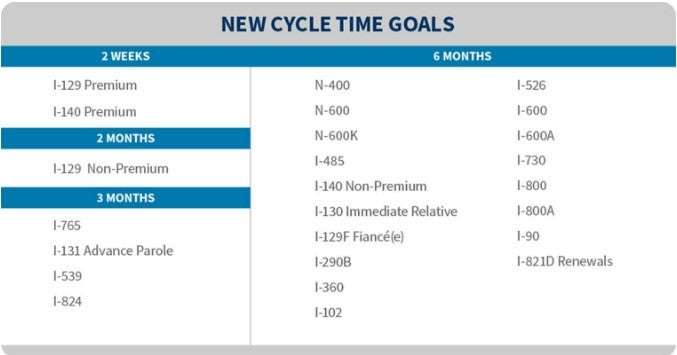On March 29, 2022, U.S. Citizenship and Immigration Services (USCIS) announced that it would implement three new actions to reduce lengthy processing times that resulted from COVID-19–related delays.
Initiative to Reduce Processing Backlogs
USCIS has established new goals for its “cycle times,” an internal metric the agency uses to measure how many months’ worth of pending cases for a particular form are awaiting a decision. In an attempt to reduce processing times by the end of fiscal year (FY) 2023, the agency will hire more personnel and improve technology to process cases and meet the new timelines for adjudication.
USCIS released the following chart outlining the new cycle time goals:

Source: U.S. Citizenship and Immigration Services
Expansion of Premium Processing Services
The U.S. Department of Homeland Security (DHS) published a final rule on March 30, 2022, to expand premium processing services to several case types. Currently, USCIS offers premium processing only for certain Form I-129 and I-140 petitions.
The final rule proposes a gradual expansion of premium processing services to additional types of filings, starting with the following case types, which DHS anticipates implementing by the end of FY 2022: Form I-140 (EB-1 Multinational Executive or Manager and EB-2 National Interest Waiver); Form I-539 (Change of Status to F, J, or M); and Form I-765 (Employment Authorization Document [EAD] for F-1 Optional Practical Training [OPT] and J exchange visitors).
For additional categories, the expansion will be gradually implemented through the end of FY 2025. USCIS has not yet stated the additional categories or specific dates for such implementation. USCIS is expected to release an announcement on its website as each category becomes eligible for premium processing.
The chart below summarizes the proposed additional categories eligible for premium processing, along with their processing times, fees, and implementation timeline:
| Case type | Processing time | Premium processing fee | Timeline for implementation |
|
I-140
(EB-1 multinational executive/manager) |
45 days | $2,500 | FY 2022 |
|
I-140
(EB-2 national interest waiver) |
45 days | $2,500 | FY 2022 |
|
I-539
(F, J, and M visas) |
30 days | $1,750 | FY 2022 |
|
I-765
(F-1 OPT and J-2) |
30 days | $1,500 | FY 2022 |
|
I-539
(E, L-2, H-4, O-3, P-4, and R-2 visas) |
30 days | $1,750 | By FY 2025 |
|
I-765
(Other types of EAD applications) |
30 days | $1,500 | By FY 2025 |
USCIS has also stated that it will not allow the expansion of premium processing services to adversely affect processing times for regular immigration benefit requests, as per congressional requirement.
Improving Access to Employment Authorization Documents (EADs)
To further mitigate gaps in employment due to lengthy adjudication times for EADs, USCIS announced that it is making progress toward a temporary final rule titled “Temporary Increase of the Automatic Extension Period of Employment Authorization and Documentation for Certain Renewal Applicants.”
Under a 2017 rule, certain eligible EAD categories are subject to an automatic 180-day extension, provided the applicant is otherwise eligible for a renewal and the renewal application was filed before the applicant’s current EAD expired. With this new announcement, USCIS is expected to increase the automatic extension period, though the agency has not yet announced when this will take place.





 />i
/>i
